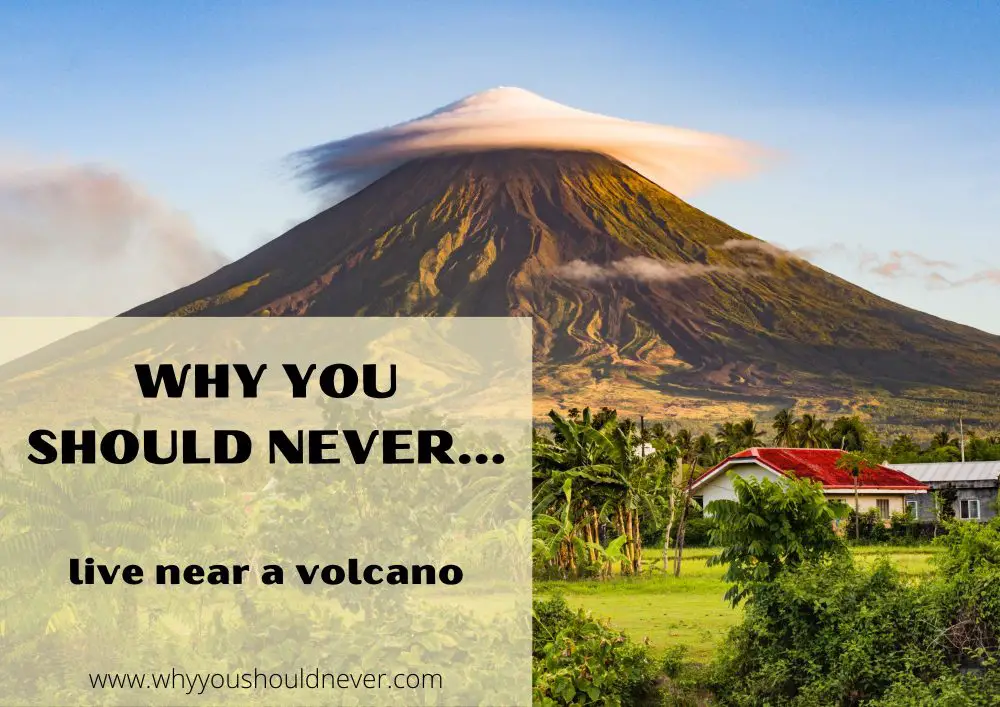![]()
Why You Should Never Live Near A Volcano
Volcanoes are amazing natural phenomena. The Earth’s surface is formed by huge volcanoes that have spewed lava and ash for millions of years. This fascinating process has created some of the most beautiful and unique landscapes on our planet.
However, living near a volcano can be extremely dangerous. Volcanoes are unpredictable and can erupt without warning. When they do, the resulting lava flows, ash clouds, and poisonous gas can destroy everything in their path.
If you’re thinking about moving to a place that’s near a volcano, we’re going to give you a few very good reasons why you should reconsider.
6 reasons why you shouldn’t live near a volcano
1. Volcanoes are unpredictable
You can never be sure when a volcano is going to erupt, and when one does, the results can be disastrous. There is, as yet, no way to predict when a volcano will erupt, so if you live near one, you’re always at risk.
In 2010, the Eyjafjallajökull volcano in Iceland erupted unexpectedly, causing widespread havoc and disruption. If you live near a volcano, you could find yourself caught up in an evacuation with very little notice.
2. Volcanoes are destructive
When a volcano erupts, it can cause extensive damage to both property and infrastructure.
In 2017, multiple eruptions of the Mount Agung volcano in Bali caused widespread damage to roads, homes, and businesses in the area. If you live near a volcano, your home and possessions could be at risk of being destroyed by lava or ashfall.
But more importantly, your life could be in danger too. Sometimes, people who live near volcanoes are killed by the resulting lava flows and mudslides from the eruption, as was the case in Pompeii, and more recently, the 2018 eruption of the Fuego volcano in Guatemala.
3. Volcanoes emit poisonous gases
Volcanoes often emit poisonous gases like sulfur dioxide and carbon dioxide when they erupt. These gases can cause respiratory problems, and in some cases, they can be lethal.
If you have asthma or another respiratory condition, living near a volcano could seriously jeopardize your health.
4. Volcanoes cause seismic activity, i.e., earthquakes
Volcanoes are often associated with earthquakes, and for good reason – they can cause them! The seismic activity caused by volcanoes can wreak havoc on buildings and other structures nearby.
This is because the molten rock (magma) beneath the surface is constantly shifting and moving. This movement can put stress on the surrounding rocks, causing them to break or fracture. These fractures can cause earthquakes.
5. Volcanoes attract tourists – and their trash
If you live near a popular tourist destination like Mount Fuji or Mount St Helens, chances are you’re constantly dealing with tourists – and their trash.
Tourists often leave litter behind, which can pollute the environment and make it difficult for locals to enjoy the area. If you live near a volcano, you might find yourself dealing with more tourists than you’d like.
6. Volcanoes can negatively impact your mental health
Living in fear of an impending eruption can take a toll on your mental health. Believe it or not, the constant stress and anxiety of living in a volatile area can lead to depression and other mental health problems.
Conclusion
Living near a volcano is a risky business. While the landscape might be breathtaking, and the tourist dollars might be tempting, it’s simply not worth the risk.
Modern science has not yet found a way to predict when a volcano will erupt, so if you live in an area that’s at risk, you’re always playing with fire.
